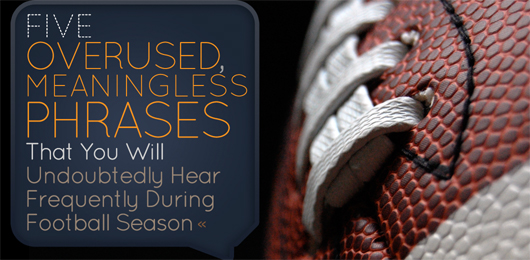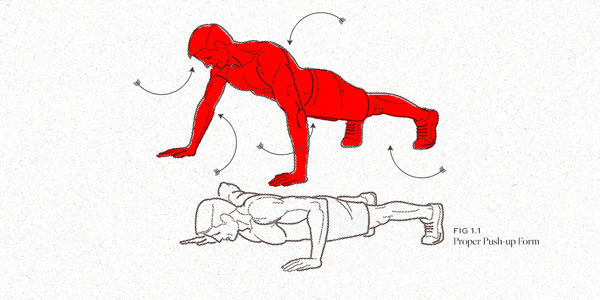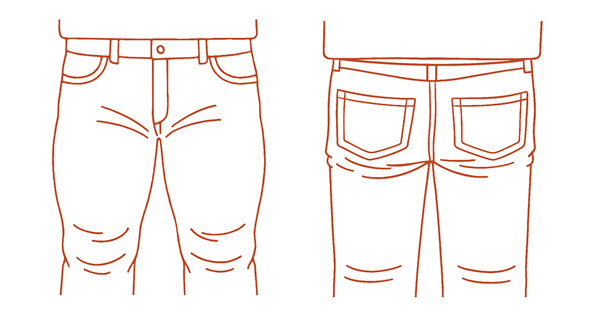Every Friday, I’m compiling a list of five things that meet one criterion. “What is that criterion,” you ask? Well, it’s going to change every week and you’re just going to have to try and keep up.
This week…
Five Overused, Meaningless Phrases That You Will Undoubtedly Hear Frequently During Football Season
The college football season is two weeks old. The 2009 NFL season is about to head into its second weekend. We’re right in the thick of it, people.
Unfortunately, this is the worst time for clichéd football phrases because nobody really knows anything, yet. Thus, media members and fans alike have no choice but to turn to tired theories, terms, and truisms. You must know, in advance, that none of these hollow statements are worth thinking about, remembering, or repeating.
Allow me to explain.
5. “Game manager.”
When a quarterback is asked/told not to be a touchdown-throwing hero and to not turn the ball over, he is labeled a “game manager.”
While this is not only a completely backhanded compliment to the quarterback himself (it’s basically a fancy way of saying “we’re not asking you to do that much because you truthfully probably can’t do that much”), it seems like an obvious term that should be in the most basic definition of “quarterback.” Quarterbacks touch the ball on every play and command the entire offense – they are all in charge of managing the game, even if they’re not that great at quarterbacking.
On top of that: what about the quarterbacks who ARE effective at throwing the ball up and down the field and scoring a bunch of points. What, so those guys don’t manage the game, too? Just because they throw for a lot of touchdowns, they don’t try to take care of the ball and help their team win through careful play? Tom Brady is very offended, right now.
4. “They will take what the defense gives them.”
A smart, experienced offense will “take what the defense gives them.” What does this mean? Well, it means they will look at the defense they’re facing and figure out a way to defeat it.
…does this even need to be pointed out? It’s football, not selecting wallpaper – you’re directly competing with another force and do not have hundreds of choices as to how you can reach a conclusion. Analyze and exploit. Seems pretty obvious, right? You would think so. But then you watch any amount of football on Sunday and every five minutes, you’re reminded of a team “taking what the defense gives them.” I can’t wait to see a team taking what a defense refuses to give them; that is going to be an extraordinary athletic robbery.
More importantly: is there even an alternative to this method? Apparently so. The opposite of “taking what the defense gives” would be an offense concerned only with sticking to their preconceived game plan, even if the opposing defense is clearly capable of stopping it. This would be the trademark of a stubborn and inept football team, though, and something we should not even dignify with attention.
3. “We’re just going to take it one game at a time.”
This obvious phrase is used in every sport but never is it more redundant than when used in conjunction with pigskin. At least in professional baseball, basketball, or hockey, you could possibly see the value in a coach or player pumping the brakes by clarifying “hey, we’re just going to take it one game at a time,” as they will have situations like three-games-in-four-days or seven game playoff series and could understandably lose their focus in the midst of a packed, extended schedule.
But in football, teams have a minimum of six days between games and only sixteen games, total. Saying “we’re just going to take it one game at a time” in the NFL is like a television viewer saying “I’m just going to take it one episode at a time” during any given season of Curb Your Enthusiasm – anything that happens once every Sunday for a handful of months does not need to be taken slowly. It happens slowly. And because there’s a week set aside for each game, it’s difficult to envision any coach or player getting caught up taking two games at a time.
2. “He keeps his legs moving.”
This is a compliment that football analysts pay to running backs after an impressive run that involved gaining yards after initial contact with a defensive player. For example: a defensive player tackles a running back but the running back does not go to the ground immediately, and even though the defensive player has his arms wrapped around the running back’s waist or legs, the running back keeps moving, in an attempt to escape the defensive player’s grasp and gain additional yards.
For some reason, this tactic is regarded as a great example of will and talent, on the part of the running back. I have to say that this confuses me because… well, what else would the running back do? Willingly lay down? Stop moving his legs the instant he feels contact from an opponent? This is professional football! Even infants keep churning their legs when a parent tries to corral them from running away and now I’m supposed to applaud a millionaire athlete for doing the same thing, despite it being an extremely instinctual part of their job?
Let’s put it this way: I’ve never seen a running back called out for NOT moving his legs… because it’s never happened. Because this is professional football.
1. “The National Football League.”
Look: all joking aside, I actually can understand the intended meaning or purpose of every other phrase on this list. But this one? Endlessly perplexing.
Around 2007, every single analyst on the planet secretly decided that the very popular and well-accepted acronym of “NFL” was no longer effective in communicating the name or context of America’s most prominent professional football league. How did they remedy this? By instead saying “The National Football League” every chance they could.
It was as if a universal lobotomy took place, and a ‘search-and-replace’ carried out on every existing and potential thought in every football conversation everywhere. From that point on, if any media member was to reference the NFL (even if they wanted to use less-distinctive-yet-perfectly-acceptable terms like ‘the league’ or ‘this league’ or ‘this sport’) that person were forced – by law, I must assume – to say “the National Football League” in full.
I don’t get it. Football experts: we know what the NFL is. We know what the three letters in the acronym stand for. We know that this sport has an organized league. We know what this sport is called. We know that teams are located all across the country. The players, the games, and/or conversations about the game are not any more dramatic or purposeful when you speak the league’s name, in its entirety. Knock it off. Seriously.
















